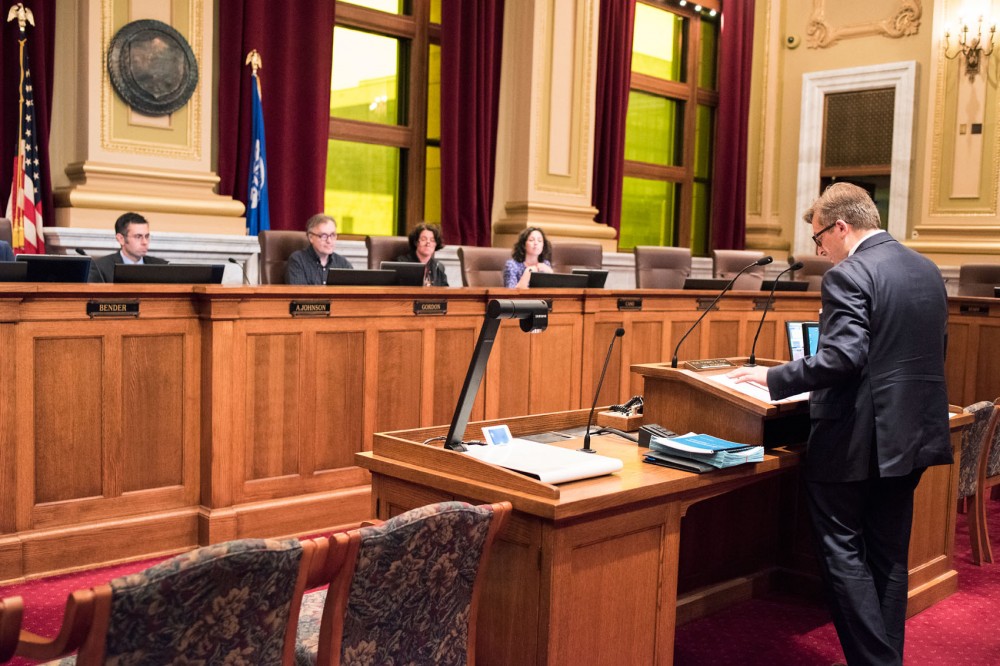A petition to place a police insurance amendment on November’s ballot was approved at a Minneapolis City Council committee meeting Monday.
Though the measure requires another step of council approval before it’s placed on any ballot, the proposal — backed by the Committee for Professional Policing and more than 7,000 signatures — would require every Minneapolis Police Department officer to carry professional liability insurance.
Under the amendment, Minneapolis would pay the base rate of the insurance. But if misconduct or lawsuits cause premium overages, the officer responsible would pay out of pocket.
This contrasts the current system, where the city budgets for lawsuits against police officers and covers their settlements, said Michelle Gross, president of Communities United Against Police Brutality.
“The city literally budgets for police brutality,” she said.
Gross — also a Committee for Professional Policing board member — said the proposal would make police less likely to misbehave.
“The beauty of it is that it provides huge incentive for police not to engage in that conduct,” she said.
Gross said about 150 of 850 Minneapolis police officers are “problem officers” with at least five complaints.
She said the proposal would affect these officers primarily, not the officers who haven’t engaged in misconduct.
“We really see [misconduct as] centered around certain particular officers, and it’s a shame because in our meetings, we literally know the names of these officers,” Gross said.
Liability insurance could target officers with a history of misconduct, said Michelle Phelps, a University of Minnesota criminology, law and deviance professor.
“There would be real costs for officers who were involved with multiple use of force charges … and that would help to weed out some of the folks on the force … who’ve had a history of being more aggressive,” Phelps said.
Still, she said she is unsure of its effectiveness given a lack of research.
Lt. Bob Kroll, president of Minneapolis’ police union, said he thinks the proposal has problems.
“To some, it may seem like a great idea, but when you drill down into the feasibility … it’s not very well thought out,” he said.
He said a liability insurance requirement would violate a state statute and police labor agreements, which require municipalities to defend officers from damages.
It could also be difficult to find an insurance company for the project, Kroll said, because various rates would be needed to cover officers with different duties and risks.
“Officers … incur different amounts of liability,” he said. “Basically, your 911 patrol officers would be the most expensive to insure, and that would go up by the frequency of contacts.”
He also said police could become overly cautious with the added stress, and this would cause officers to be less proactive on the job.
“They’re going to be very, very hesitant to involving and engaging in anything,” Kroll said.
He said he doesn’t think voters who want “good police protection” will want this amendment passed.
“Officers that don’t do anything aren’t going to get complaints,” Kroll said. “Officers that are the ones that are out there digging and doing aggressive police work are going to get complaints.”
Still, despite the concerns, Phelps said she thinks the proposal is a good starting point toward improving police-community relations.
“I think this mechanism would help to solve that problem,” she said. “It would help solve the problem of there not being real consequences for use of force.”
But Phelps acknowledged proper use of force depends on the situation.
“We want police officers to be proactively engaged. … We want them to stop people when they’re committing wrongdoings,” she said. “But what we don’t want is police stopping masses of people on demographic characteristics alone for really low-level stuff, [and] then those situations escalate.”
Gross said she also disagrees with the concern officers will be less proactive.
She said the liability insurance method has helped control misconduct before, like in medical professions.
“It’s an old concept; it’s just the novelty of it is applying it to policing,” Gross said.
But because of the legal conflict, Kroll said he doesn’t think the city will vote to put the amendment on the ballot at its final vote. The City Council hasn’t set a date for its final vote but could vote as early as August.
Kroll said if the city puts the measure on the ballot, the police union will file an injunction against the proposal, adding he thinks there’s enough evidence to show it violates state statute. If the injunction isn’t granted, he said the union would initiate an expensive PR campaign against the amendment.
Regardless, Kroll said people who want hardworking police will vote against the amendment.
But Gross said she’s confident the amendment will be passed if put on the ballot, considering an overwhelming positive response to the proposal.
“I feel like … 10 or 15 years from now, people are going to say, ‘What? Why didn’t we do that before?’” she said.








